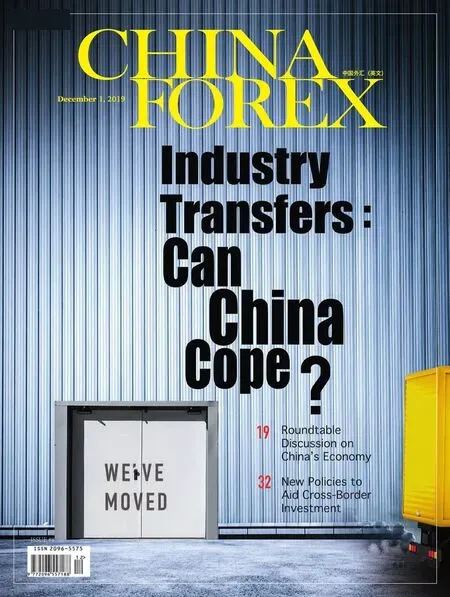Q & A On the Notice by the State Administration of Foreign Exchange on Further Facilitating Cross-Border Trade and Investment
01
Q: What measures will be taken in order to implement the pilot program on facilitating foreign exchange receipts and payments related to the trade in goods?
A:In the Notice by the State Administration of Foreign Exchange on Further Facilitating Cross-border Trade and Investment (SAFE Document No. 28 [2019] to be referred to as the Notice), Article 1 - Expanding the pilot program of facilitating foreign exchange receipts and payments in trade -refers to expanding the regional scope and business scope of the program on the basis of its initial pilot in the Guangdong-Hong Kong-Macao Greater Bay Area, Shanghai and Zhejiang.Similar to previous pilot programs, local SAFE authorities will formulate their own pilot plan based on the actual needs in their area. They will then announce conditions, procedures and management requirements to the public. Eligible banks may, in accordance with the provisions, submit a filing with SAFE and conduct this business as part of the pilot program.
02
Q: Article 5 of the Notice stipulates that the small and micro e-commerce companies participating in the pilot program need to have foreign exchange receipts or payments in the goods trade that are less than US$200,000. How can banks and payment institutions ensure this requirement is met?
A:The Notice of the State Administration of Foreign Exchange on Issuing the Measures for the Administration of the Foreign Exchange Business of Payment Institutions (SAFE Document No. 13 [2019]) states that banks and payment institutions should refer to the following principles when handling foreign exchange receipts and payments on behalf of small and micro e-commerce businesses. First,they should monitor through their own electronic business system the annual foreign exchange receipts and payments in the goods trade by any company whose business was handled by their institution. For enterprises with less than US$200,000 in foreign exchange receipts and payments within the calendar year,banks can skip the registration in the directory of enterprises with foreign exchange receipts and payments. Second,for enterprises that are not on the list but have more than the equivalent of US$200,000 in annual foreign exchange receipts and payments, SAFE will notify the relevant payment institutions on a monthly basis. Banks and institutions then should check these notices against their own client list. Registration of these companies must be completed within one month. In the near future,payment institutions will be able to receive automatic transmissions of such companies through the SAFE system.
03
Q: Article 8 of the Notice stipulates that business reports such as trade credit and trade finance of enterprises may be handled online. Which business reports are included in this regulation?
A:According to the Notice of the State Administration of Foreign Exchange on Matters Concerning the Issuance of Foreign Exchange Administration Rules for Trade in Goods (SAFE Document No. 38[2012], hereinafter referred to as Document No. 38), an enterprise must fulfill its reporting obligations if the reporting conditions are met for “trade credit business,” “trade finance business,” “transit trade receipts and payments business,” “margin business” and “other special trade business.” As of January 1, 2020, regardless of whether there is a gap of more than 30 days between the date the business occurred and the actual reporting date, the above-mentioned business reports can be processed online through Foreign Exchange Monitoring System for Trade in Goods. The statutory reporting for the above-mentioned business must be carried out in accordance with Document No. 38. For deferred payment business of more than 90 days, an enterprise must make a report of the payment information within 30 days from the date the goods were imported.
04
Q: Article 9 of the Notice has relaxed the policy on accounts for verification of export proceeds. Since that policy change, has it been necessary for income from offshore resales and exchange refunds ( in case of Class A enterprises), and income from trade in goods (for Class B/C enterprises) to be placed in accounts for verification first?
A:Article 9 of the Notice has made it clear that an enterprise can,in handling income from the trade in goods, decide whether or not to open an account for verification of export proceeds. This article applies to both the offshore resales and exchange refunds for Class A enterprises, and income from trade in goods for Class B and Class C enterprises. Banks are required to conduct a due diligence review to determine authenticity, compliance and reasonableness of the abovementioned business in accordance with existing regulations.
05
Q: When handling the registration of a company in the directory of enterprises,enterprise branches need to provide the Application Form for Registration in the Directory of Enterprises for Foreign Exchange Payments and Receipts for Trade in Goods and a Letter of Confirmation for the Handling of Foreign Exchange Payments and Receipts for Trade in Goods. Do these materials require the signature of the legal representative of the enterprise?
A:When handling the registration in the directory in accordance with Article 10 of the Notice, relevant materials may be signed by the legal representative of the enterprise or the person in charge specified in the Business License of the branch.
- China Forex的其它文章
- Data
- From “Made in China” to“Chinese Assets”
- New Policies to Aid Cross-Border Investment
- Capital Account Convertibility and China’s Drive to Open its Financial Sector
- Combining Cross-Border Direct Loans and Foreign Exchange Derivatives
- China’s Cross-Border E-Commerce: Growth But Challenges Ahead

